
While many institutions have been preparing missions to Israel, eight men living in New Rochelle found that they could not partake in any for various logistical reasons, so they came together on their own; they planned and executed a five-day mission for themselves, action-packed from beginning to end.
Moshe Abehsera, one of the men who initiated and attended the mission, explained that there were other reasons that he preferred a grassroots, small mission of friends versus those of larger institutions. “We wanted to visit people who don’t necessarily have connections with organizations,” he said. “We wanted to see people who don’t have big donors or outside help, who are just putting things together with sticks, tape and gum.”
An example of this, Abehsera said, was when the group visited a new rest stop in the south, right outside of Ashekelon, run by his aunt, Rivka Knafo. The rest stop serves 1,200 meals a day to soldiers going in and out of Gaza. His aunt and the other volunteers had showers built for the soldiers, along with six washing machines and dryers for their uniforms. Abehsera explained that this rest stop doesn’t have a 501(c)(3) designation or official recognition. It’s all just unofficially supported by nearby people, such as restaurant owners, butchers, vegetable stores and local food distributors.
“Our main goal was to show up and give support and hugs and thank the people for protecting our nation—and the world. Many say that when Americans go on missions, it’s really for ourselves: It makes us feel better since we feel helpless here. But it truly is good for the Isrealis to see us come. They need to feel that their brothers and sisters from the other side of the world have their backs, and to know that we are constantly thinking and caring about them.”
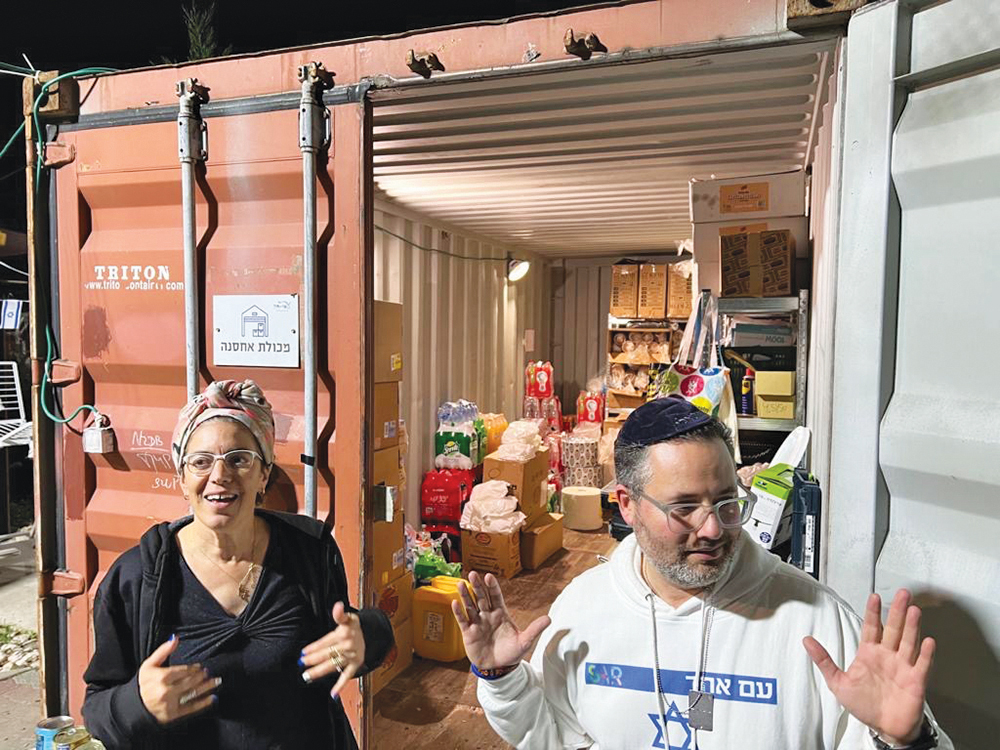
Joel Orgel, another member of this mission, said that because each person from the group has separate professional and personal connections in Israel, there were many touch points among them to open various doors.
Orgel runs the rental space for billboards in Times Square. In the weeks leading up to and including New Year’s Eve, he was working with the Hostage Family Forum to put photos of the hostages on the billboards in Times Square (at the location where the ball drops.) He arranged for the group to visit the families of the hostages to show their support at the Hostage Center. Orgel noted that the Hostage Center’s creative messaging included no mention of Israel. “It’s really about right versus wrong, good versus evil, terrorists versus hostages. It’s not religious or political. It’s just raising awareness, so that the hostages can be brought home safely.”
They met with Shelly Shem-Tov, mother of hostage Omer Shem-Tov, and a Bedouin Arab, who had several family members abducted. David Mann, another member of this mission, said that he asked the Arab Bedouin, “Why would they take people from your family? Don’t they just want the Jews?” The man answered that Hamas wants to create frenzy, fear and panic, and that’s how they stay in power. “It’s about the brutality, not about the ideal,” the Bedouin told Mann. Omer’s mother told them: “People describe Hamas as animals. They aren’t animals. We like animals. They are monsters.”
On Friday, the men went to Har Herzl to visit the graves of fallen soldiers. They unwittingly arrived at the funeral of a soldier, Harel Sharvit, who had fallen that morning in Gaza. Orgel explained that it was humbling and powerful to attend his funeral, and extremely upsetting to see the lines of new graves, covered in fresh soil, from the soldiers who had died on Wednesday and Thursday.
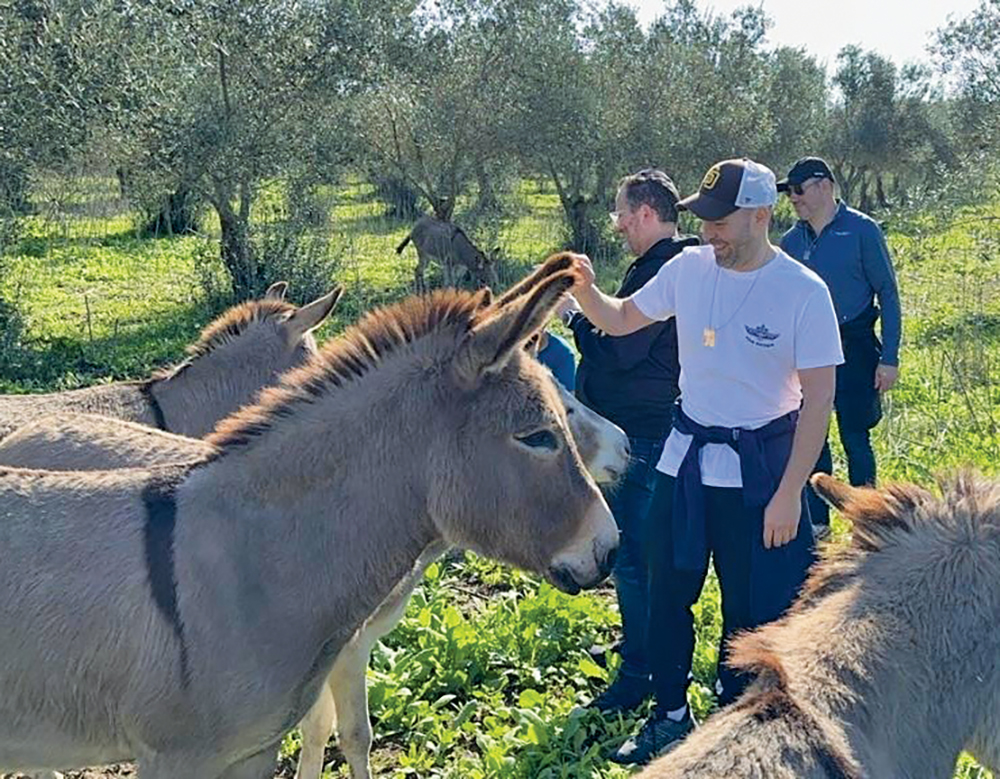
The men embraced Sharvit’s family at the end of the funeral. They also spoke with his platoon-mate, who told them that he had held the soldier’s hand as he died. Sharvit, 33 years old, was not meant to be in the front lines in Gaza. He so passionately wanted to fight that he pushed himself into a unit there, voluntarily. Rabbi Yitzhak Sharvit, his father, explained to them that “Harel went into Gaza because he felt that Bnei Yisrael and Eretz Yisrael were stepped on. Their kavod—honor—was stepped on. And he wasn’t going to allow it.”
After the funeral, the men were waiting for a taxi, and they spoke with another man, also waiting. He had attended the funeral as well, and had been Sharvit’s close friend. This man was getting married soon, and he showed them a text exchange that was just a few days old. Sharvit’s text read (in Hebrew), “I’m heading back into Gaza, so I think I will have to miss your wedding. But I will try to FaceTime you, and I will give you a big hug and kiss as soon as I can.”
The mission members decided that they wanted to visit Sharvit’s family at their shiva in Kochav Ya’akov. They sat with Rabbi Sharvit for almost an hour. He was touched that they came. He hugged each one of them and said, “You don’t know me and I don’t know you. But you came to Harel’s funeral and you are here, comforting me at my son’s shiva. That is the power of am Yisrael.”
Abehsera added that a visitor at the shiva was crying hard. Rabbi Sharvit said to him in Hebrew, “It’s hard but it’s good.” The visitor said, “What do you mean? How can you say that?” Rabbi Sharvit answered: “Doesn’t it hurt when you get stitches? Stitches hurt. But they fix the problem. God is helping us fix something here. God only does things that are for the good.”
Abehsera reflected that it reminded him of a shiva visit he paid several years ago in Israel during operation Tzuk Eitan in Gaza. The grieving father said, with acceptance: “This is what we do. This is who we are. We will always be this way.”
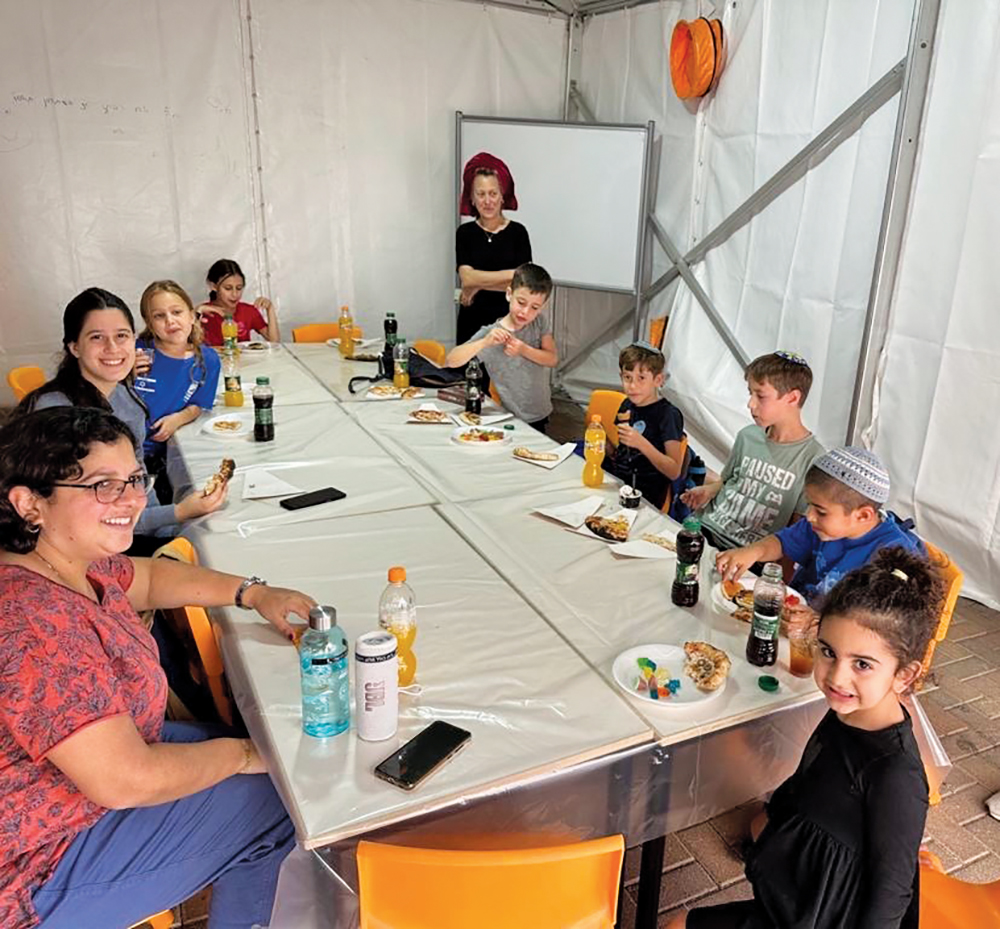
Kibbutz Sa’ad.
The men then went to Soroka Hospital and Tel Hashomer to visit wounded soldiers. “It was amazing to see their resolve and spirit even after some very serious injuries,” Orgel said. “They were proud to serve and they wanted to jump back into the action.” One man, whose lower leg had been amputated as a result of a battle in Gaza, was not sad. He showed them a video that captured part of the battle, and proudly told them how he and his fellow soldiers eliminated the terrorists. He smiled triumphantly. “And all I lost for that was the bottom of my leg! I could have gotten hit in another part of my body and I would be dead.”
Abehsera spoke of a family praying for their son and sibling who had been seriously wounded and was about to undergo a surgery. The men sat and said Tehillim with the family. They were very upset to find out the next day that the soldier had not survived the surgery.
While all of these experiences were difficult for the mission members, the most devastating was the walk-through of Kibbutz Be’eri. Mann was the only member willing to discuss it. They went with a guide who showed them videos that are not shared with the general public, and audio WhatsApp messages from October 7 at the kibbutz. They listened to messages of people pleading for help, describing what was happening, sending messages of love and saying goodbye.
Mann said that in order to mentally prepare himself, he had tried to recall scenes of savagery from the TV show “Game of Thrones,” because that was the most disturbing imagery he could think of. “But I wasn’t prepared,” he said. “This was so much worse.” Mann admitted that he has had difficulty sleeping through the night ever since.
Their guide was extraordinary, Mann noted, in that he didn’t tell anyone what to think. He just shared the facts. He didn’t add any comments of his own, and there was no anger in his voice. When Mann observed this out loud at the time, his guide answered that he had learned to numb his feelings in order to be able to give the tours. “It must be destroying a little bit of his soul every time,” Mann reflected.
Mann concluded his description of the tour by saying that he is a descendant of Holocaust survivors, and has gone on a pilgrimage to Auschwitz and other concentration camps. “When I walked there, it was 50 years later, and it felt black and white. All the color had drained from everything I saw. But this—this is days later. It’s vivid—in color. There are still children’s colorful painted rainbows hanging on the walls.”
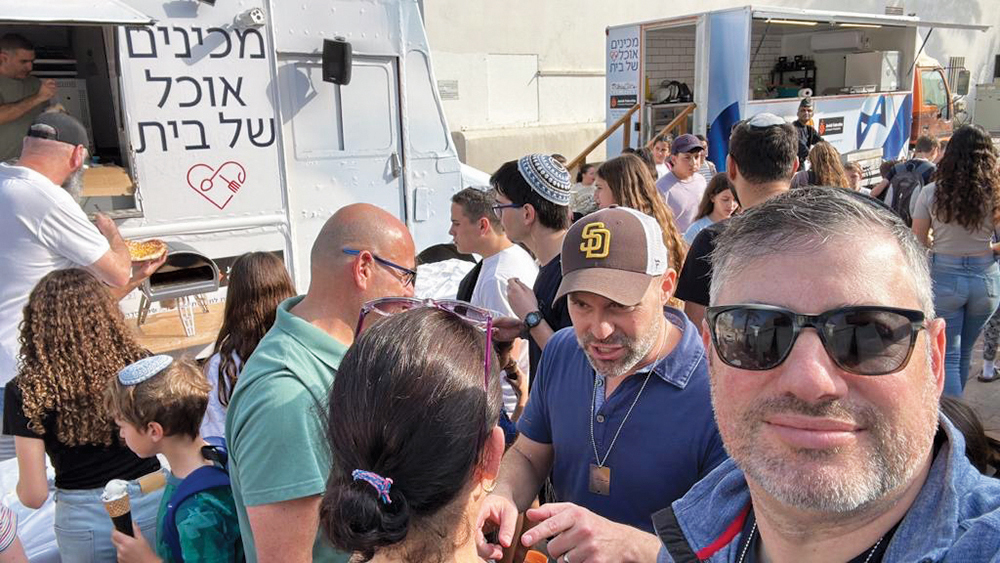
Abehsera was brought to tears as he remembered their time in Be’eri: “The only thing I will say about it is the juxtaposition of the amazing natural beauty of the area with the horror and hell that took place there, which is unfathomable.”
Orgel explained that everywhere they went, they felt the unity of Israel. They went to dinner one night at a shawarma restaurant in Ashkelon. Someone started singing “Am Yisrael Chai,” and the men got up and started dancing in the restaurant. The other diners joined them. “I felt how I am really part of something bigger than myself. I’m really part of this nation.” The waitress thanked them as they left. She said, “Your spirit and positive energy means so much to us.”
Abehsera arranged through an old friend to sponsor a barbecue for a base of soldiers. The men were brought to a base of 1,200 soldiers in the shemona matayim unit (Unit 8200—high-level intelligence). The base was so secure that the men had to be escorted to the restroom. The soldiers thanked them profusely for the barbecue. Mann said: “It felt so strange that they were thanking us. We were trying to thank them.”
Another day, the men teamed up with Eran Ginzberg, the former chef of SAR Academy and Camp Moshava. His home in the south, Kibbutz Sa’ad, had miraculously escaped infiltration by Hamas on October 7. The members of Ginzberg’s kibbutz are currently living in a hotel by the Dead Sea. When the men asked what they could do, Ginzberg suggested that they hire a pizza/crepes truck and an ice cream truck to make a party for the displaced children who miss their homes. Abehsera said that the kids were friendly and mature beyond their years. They spoke openly with the men. One little girl proudly told him about her older brother in Gaza, who sent her a photo of him drawing her name in the sand with a heart around it.
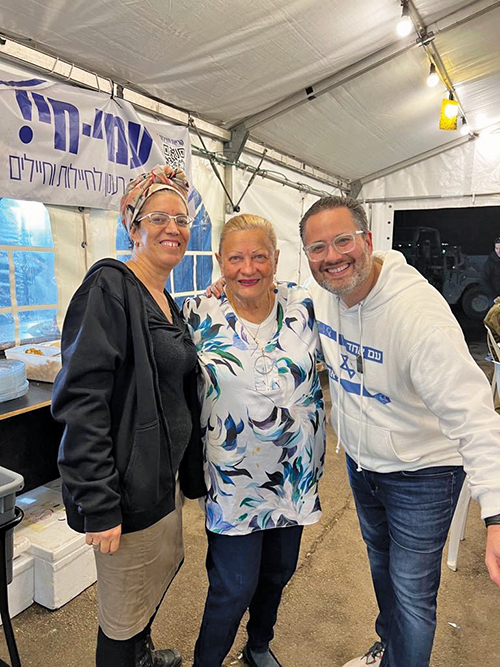
“We didn’t attend a single lecture,” Abehsera said, “but we were trying to catch a glimpse of what it means to be part of the fabric of Israeli society. We tried to feel and taste as much as we could of what they are going through. It’s mostly very upsetting stuff, but we also witnessed the tremendous resolve and achdut—unity—that has come out of the horror.”
Orgel added that they left on “an Israel high.” He wants to make sure that the feelings and powerful lessons don’t fade. “We are all saying to each other now: ‘How soon can we get back there?’ We are struggling to make sure that this wasn’t just a moment in time. We will never forget this life-changing, emotional experience. We will each have to figure out how to bottle this feeling and hold on to it.”









